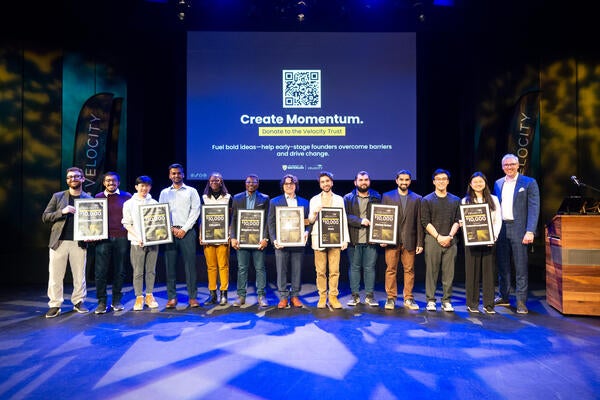
Learning a new language with a smartphone avatar
Spanish instructor launches second-language startup while studying entrepreneurship at Waterloo

Spanish instructor launches second-language startup while studying entrepreneurship at Waterloo
By Suzanne Bowness Communications and Public Affairs
After many years of teaching Spanish to Waterloo students, Camelia Nunez knows beginners learn best by engaging in meaningful conversations. She also knows undergrads spend a lot of time chatting on their smartphones.
So she came up with an idea: Why not use smartphones as a platform for students to receive and respond to messages in their new language?
With a solid concept, Nunez began a Master of Business, Entrepreneurship, and Technology (MBET) at the Conrad centre at University of Waterloo. Support from MBET mentors and professors helped her launch Milao, a language learning chat tool for smartphones.
“My experience shows that you don’t necessarily have to be an engineer to have a good idea. Great ideas do come from arts and humanities—and when you combine them with science, great things can happen,” says Nunez, who is also a PhD student of Hispanic linguistics.
Milao, which is Modern Greek for “to communicate,” is an on-demand chat program aligned with university curriculum for beginner language courses. It lets users chat about typical beginner language topics with an avatar – topics like ordering food or asking for directions.
Tool uses artificial intelligence
The tool combines a technology called “natural language processing” with artificial intelligence to generate text that corresponds to human speech.
While the MBET experience is giving Nunez support with strategy, leadership, finance, and accounting, it was in the practicum component that she found colleagues enthusiastic to help her turn Milao into a business.
Besides developing their product, the fledging company has also participated in several business competitions across the country, raising their exposure in the community. Recent awards include a $25K Jump Start grant from the federal government and $50K Ontario Centres of Excellence grant. With a staff of 12, the startup has now settled into the Accelerator Centre, an incubator at Waterloo’s Stratford campus.
Milao is conducting a beta test with 200 first-year Waterloo Spanish students and the team hopes to eventually license the technology to other universities.
While the company will start out focused on the familiar student market, Nunez says her team plans to develop consumer and corporate versions. They’re also going to expand into new languages, starting with English next year.

Read more
From non-invasive health care solutions to sustainable construction material and AI-driven coaching, the funding supports future-centric ventures

Read more
Velocity and Socratica’s builder communities help Waterloo students find their people and build their entrepreneurship side

Read more
Discover how Waterloo alumni are driving Canada’s economy with five tech companies making a local and global impact
The University of Waterloo acknowledges that much of our work takes place on the traditional territory of the Neutral, Anishinaabeg, and Haudenosaunee peoples. Our main campus is situated on the Haldimand Tract, the land granted to the Six Nations that includes six miles on each side of the Grand River. Our active work toward reconciliation takes place across our campuses through research, learning, teaching, and community building, and is co-ordinated within the Office of Indigenous Relations.